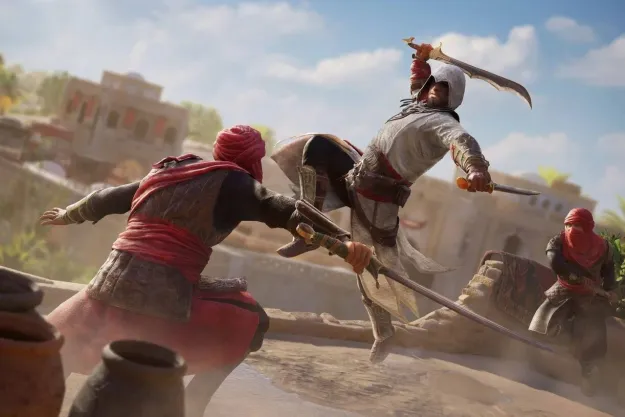
“When you put yourself back in 2003, it was quite ambitious.”
Prince of Persia’s influence on the first Assassin’s Creed is apparent to anyone familiar with AC developer Ubisoft Montreal’s former franchise, with their shared emphasis on fluid acrobatics and an ancient, Middle Eastern setting. According to Assassin’s Creed Origins creative director Jean Guesdon, who joined the original game’s development team in its last year of production, this was intentional.
“What I saw and lived during this crazy year was an incredible ambition to bring the fluidity of movement developed for Prince of Persia to huge environments, especially cities,” Guesdon told Digital Trends. “The idea was to use incredibly agile abilities on all buildings in a location which, when you put yourself back in 2003, was quite ambitious. I don’t know of any other game that was trying that at the time.”
Origins
By the time the game released in 2007, the series’ split emphasis on three main pillars – combat, navigation, and stealth – was still unique to Assassin’s Creed. That philosophy has remained constant through every iteration, but the particulars of how each pillar works have varied extensively. In this year’s Origins, for instance, the towers are no longer used to unlock landmarks on the map, and instead work as fast-travel points. More recently, we’ve seen a number of other games such as The Legend of Zelda: Breath of the Wild and Middle-earth: Shadow of War riff on the same basic concept, which Guesdon attributed to creators’ own consumption of games rather than any attempt to “rip off” Assassin’s Creed – after all, Ubisoft’s own Far Cry series has taken many elements from it, as well.
“In movies, we know that some specific framing carries specific emotions and impact, but are all movies using bullet-time shots kind of Matrix rip-offs? I don’t think so. The Matrix introduced new ideas and ways of doing things,” he said. “It’s that simple.”
The original Assassin’s Creed had built a basic framework for its many sequels, but Ubisoft knew changes had to be made in order to make it more engaging. Assassin’s Creed II, the first game to star fan-favorite character Ezio Auditore, ditched the repetitive missions of its predecessor and introduced a more complex and challenging combat system. It kept the previous game’s open-world structure, however, and built on its modern-day science-fiction element with the continued story of Desmond Miles.
Revelation
Over the next three years, Desmond’s battle against the Abstergo corporation – a cover for the nefarious Templar organization — continued, and it came to a close with Miles’ death in Assassin’s Creed III. For many series, this would be the end of the line, but Ubisoft used it as an opportunity to expand on the story and turn Assassin’s Creed into a full-fledged universe.
Desmond’s story being over, we wanted to show that the franchise was solid enough to explore new directions.”
“It was a conscious decision to confirm that Assassin’s Creed was becoming a consistent universe and not only one story,” Guesdon said. “In 2012, Desmond died saving the world. And since then the present day of our lore is merged with our real world. Desmond’s story being over, we wanted to show that the franchise was solid enough to explore new directions.”
This led to the creation of “Abstergo Entertainment,” the in-game developer (and self-referential Ubisoft proxy) responsible for creating the historical experiences players are sent through in each game. The new premise allowed for a wider range of historical periods, leading to the next game being set in the 18th century Caribbean, Assassin’s Creed IV: Black Flag. It was unlike anything we had seen from the series before, with a new emphasis on naval combat, exploration, and piracy, but it maintained series continuity with the modern-day meta-narrative. The game of course also integrated plenty of the franchise’s familiar tropes, such as wrist-mounted blades and the iconic white hood.
Brotherhood
With this year’s Origins, Ubisoft had perhaps its biggest challenge yet, as the company was tasked with exploring the very beginning of the series’ eponymous killers. The ancient Egyptian tale intertwines the story of conflict between Cleopatra and new pharaoh Ptolemy with revelations about how the Assassin Brotherhood came to exist in the first place.
“We wanted to tell a story of the origins of the Brotherhood – how this group of men and women protecting free will came to organize itself,” Guesdon said. “We also knew that this story would take place in Ancient Egypt, with a character being a Medjay (which was a known profession), so [protagonist] Bayek should be more of a warrior than an Assassin. He actually is a ‘proto-assassin.’”
This narrative decision allowed for Ubisoft to take more liberties with its combat system, as well, replacing many of the instant-kill moments with a system requiring more finesse, dodging, and carefully-timed hits, which feels more in line with contemporary action RPGs. These changes were a long time coming, particularly after the lukewarm reception to the series previous two entries, Unity and Syndicate.
While Guesdon said the combat changes were also implemented to give players more control, it happened to work perfectly with the writers’ ambitions. It was all part of Ubisoft’s goal to “reinvent the Assassin’s Creed experience,” but it’s a task that certainly won’t end with Origins.
“I think that Assassin’s Creed as a series and Origins in particular show that the franchise and its fascinating universe have such strong foundations that they can evolve, sometimes a lot, without losing their identity,” Guesdon added. “’Everything is permitted,’ literally.”
Editors' Recommendations
- Assassin’s Creed Mirage comes to iPhones and iPads this June
- Assassin’s Creed Nexus VR turned me into a sociopath (and I love it)
- iPhone 15 Pro can natively run the latest Resident Evil and Assassin’s Creed games
- Assassin’s Creed Mirage: release date, trailers, gameplay, and more
- Assassin’s Creed Mirage is coming out earlier than expected







